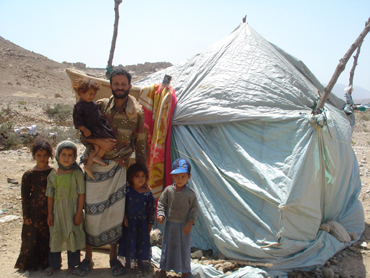News, December 2009
www.aljazeerah.info
Archives
Mission & Name
Conflict Terminology
Editorials
Gaza Holocaust
Gulf War
Isdood
Islam
News
News Photos
Opinion Editorials
US Foreign Policy (Dr. El-Najjar's Articles)
|
Editorial Note: The following news reports are summaries from original sources. They may also include corrections of Arabic names and political terminology. Comments are in parentheses. |
Houthis accuse Yemeni, Saudi troops of Using excessive force

| Yemeni refugee family: An estimated 175,000 people have been affected by the conflict in Yemen since 2004, including those displaced by the latest surge in fighting between Government forces and Al Houthi rebels that began in August. |
By: Mohammed Bin Sallam
Yemen Times, 25-11-2009
SA’ADA, Nov. 25 –
Saudi fighter jets continue to hit Houthi strongholds in Hasama, Malahidh, Dhahyan, Razih and Ashaeesh areas, local sources from the Sa’ada governorate said, adding that the airstrikes coincide with heavy mortar and rocket shelling by both Yemeni and Saudi armies in other areas.
In a statement distributed to the various media outlets, Houthi followers said that Saudi forces began on Monday advancing toward Yemeni lands from various border fronts, using all types of ground and aerial weapons. Houthis accused both armies of using excessive force against citizens.
The statement added that the Saudi army uses tanks, heavy mortars, Apache helicopters and F-15 jets in the operation, pointing out that “clashes are still going on in various fronts at the Yemeni border in Malahidh, Shadha and Hasama districts.”
Spokesman for the Houthis, Mohammed Abdussalam said in a telephone conversation with the Iranian Al-Alam channel that Saudi jets launched 35 raids Monday on various Sa’ada villages, confirming that dozens of civilians were killed in the raids, particularly in the Yemeni Najain city, which is 200 km away from the border of Saudi Arabia. He noted that the situation was calm in the majority of fronts.
A Saudi military source said from the battleground that “offensives launched by Houthis are direct suicide operations, which makes it impossible to achieve a military victory.
The source added that Houthis attempt to cause human losses among the Saudi troops.
Another Saudi senior military official told Al-Sharq Al-Awsat
newspaper that Houthis have no fixed plans, adding they most often
change them. “They sometimes hide among internally displaced persons
(IDPs), fire bullets from behind IDPs or hide inside homes in border
villages and launch offensives overnight.”
Al-Sharq Al-Awsat
newspaper reported that there is an exchange of fire between Houthis and
Saudi troops in various fronts including the Dukhan Mountain and Jalah
village, adding that Houthis hide during daytime and launch their
attacks overnight. As a result, Saudi forces resorted to removing any
old homes in villages near its border with Yemen.
The newspaper added that Houthis succeeded to launch operations with RPGs and Katyousha missiles, and they engaged in gunfire inside Saudi territory.
According to the newspaper, the Saudi forces, backed by Apaches, eliminated a Houthi group that was entrenching in the Saudi Ain Harah area, near the Command of Saudi Operations, as it was plotting to destroy mortars belonging to the Saudi army.
The newspaper went on to say that hundreds of Houthis launched surprise attacks against Saudi troops after midnight and at down times early this week.
Somalis involved
Al-Sharq Al-Awsat newspaper published a report revealing that Somali fighters have been involved in supporting Houthi rebels in their fight against the army. It said that those Somali fighters receive money in exchange for their support for Houthis.
Arab League Secretary-General Amro Musa received a report from Ambassador Ibrahim Al-Shuaimi, the Arab League Delegate in Mogadishu, in which the latter didn’t rule out the possibility of Somali refugees being involved in the Houthi-led rebellion in north Yemen.
“There are some Somali mercenaries who back Houthis in their rebellion against the state,” the report said. “Those mercenaries may include leaders belonging to the armed Islamic groups that oppose foreign military presence in the Somali land and the interim authority led by Sheikh Shariff Sheikh Ahmad.
The Yemeni Defense Ministry-affiliated 26sep.net quoted a Yemeni official military source as saying on Monday that the army thwarted Houthis’ attempts to sneak into strategic positions used by the army in Sa’ada hills.
The source added that the army carried out qualitative operations in
Sa’ada, destroying several Houthi posts in Gharaz, Gufl and Tamalus
areas and hitting Houthi targets in Jabal Qais and Mazram areas.
During his talk with the Aljazeera satellite channel on Monday evening,
Parliament Member Yahya Badraddin Al-Houthi, who is currently living in
Germany, denied that his men accepted the five terms listed by the
government as a condition to stop its operations against Houthi
followers.
This came after a Yemeni official source declared last Thursday that Houthis field leader Abdulmalik Al-Houthi accepted the five terms, announced by the government as a condition to stop the war.
Humanitarian situation
Regional director for the UN Children’s Fund (UNICEF), Tomas Devin,
warned against worsening malnutrition and potential cholera outbreak in
the Mazrak IDP camp in Hajja governorate, which hosts over 10,000
people. According to Devin, another 20,000 IDPs are living outside the
camp.
Fair Use Notice
This site contains copyrighted material the use of which has not always been specifically authorized by the copyright owner. We are making such material available in our efforts to advance understanding of environmental, political, human rights, economic, democracy, scientific, and social justice issues, etc. We believe this constitutes a 'fair use' of any such copyrighted material as provided for in section 107 of the US Copyright Law. In accordance with Title 17 U.S.C. Section 107, the material on this site is distributed without profit to those who have expressed a prior interest in receiving the included information for research and educational purposes. For more information go to: http://www.law.cornell.edu/uscode/17/107.shtml. If you wish to use copyrighted material from this site for purposes of your own that go beyond 'fair use', you must obtain permission from the copyright owner.
|
|
|
|
||
|
||||||


